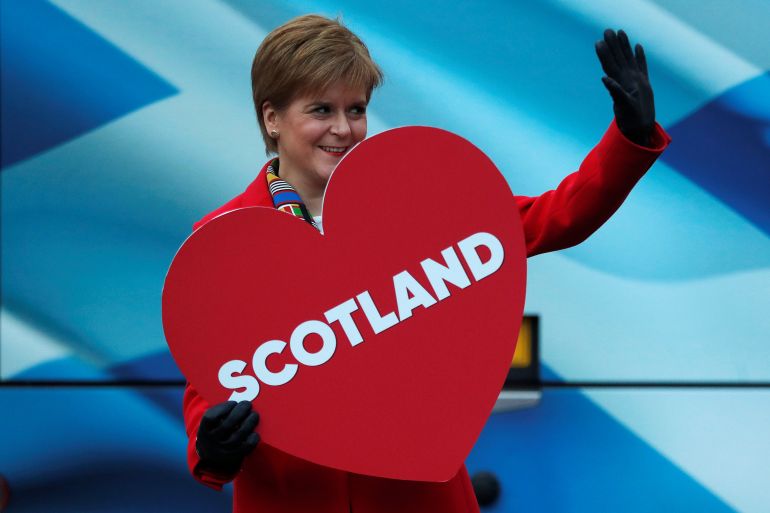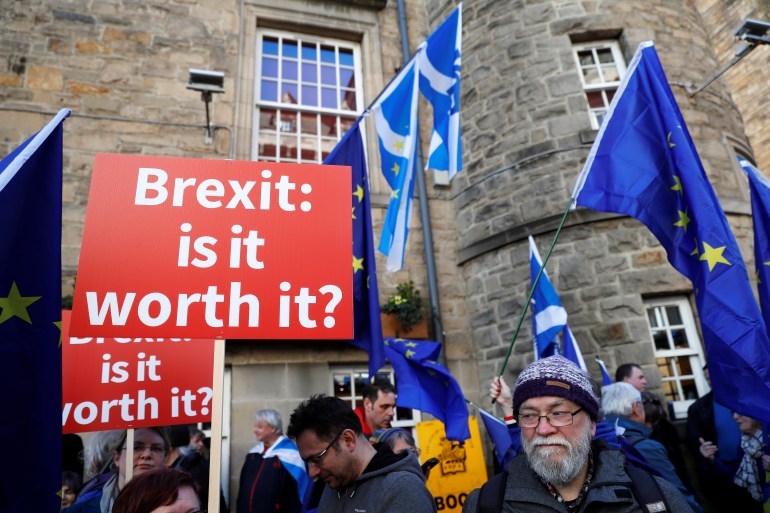With Brexit complete, fervour for Scottish independence grows
Centuries of union between Scotland and England are straining amid the UK’s departure from the EU and the COVID pandemic.

Glasgow, Scotland – On January 3, British Prime Minister Boris Johnson was interviewed by BBC presenter Andrew Marr.
Johnson had not long agreed to a post-Brexit trade deal with the European Union, ending months of bitter wrangling following the United Kingdom’s official departure from the trading bloc on January 31 last year, and a COVID-wracked Britain was beginning 2021 on a path that was first sanctioned by the British public in the 2016 referendum.
Keep reading
list of 4 itemsScottish fishermen halt exports due to Brexit red tape
Can Scotland become independent?
The Lancet editor: UK ‘steadfastly refused to follow the science’
When Marr turned his attentions to Scotland, Johnson bristled.
“A lot of people are observing this from afar, including in Scotland,” said Marr, after questioning the prime minister on his handling of the coronavirus pandemic.
“Why do you say afar?” Johnson snapped back, as Marr attempted to clarify his point. “[Scotland is] part of our country.”
The Conservative Party leader’s agitation, while subtle, was unmistakable.
Governed by the pro-independence Scottish National Party (SNP) at the devolved Scottish Parliament in Edinburgh since 2007, Scotland voted against becoming an independent country in 2014, but, after decisively rejecting Brexit two years later (when voters from England and Wales endorsed the move), it now appears to be straining at the leash of the British state.
Eighteen opinion polls in a row, including one published on January 14, have indicated that Scotland’s voting public is now ready to embrace independence.

Observers have said there appears to be little that Johnson can do to reverse the trend and make the UK’s place outside the EU, now an established fact, palatable to a sceptical Scottish electorate.
“I can’t see how the Conservatives can hope to sell Brexit to people in Scotland and, indeed, [they] are struggling to sell it across the UK,” James Mitchell, a professor at the University of Edinburgh’s School of Social and Political Science, told Al Jazeera.
“If anything, I’d expect opinion to shift increasingly against Brexit and the Conservatives in Scotland. It has never taken much to convince most Scots that the Conservatives are ‘anti-Scottish’ regardless of what they do. The longer [they] are in office in London … support for independence is likely to harden.”
‘More to fear from remaining within the UK’
While the UK as a whole voted by 52 percent to 48 percent to leave the EU in 2016, Scotland voted by a hefty 62 percent to remain.
As such, the pro-EU SNP, led by the party’s staunch Europhile leader and Scotland’s First Minister Nicola Sturgeon, has long backed the idea of an independent Scotland re-entering the European bloc as a sovereign nation-state to Scottish voters, who also consistently favour Sturgeon over Johnson in opinion polls.
Pro-independence campaigners, wounded after their 55 percent to 45 percent defeat in 2014, now sense that the momentum could undo the age-old Act of Union which united Scotland and England into Great Britain in 1707.
“Right now,” pro-independence blogger James Kelly of the Scot Goes Pop blog told Al Jazeera, “the fear [of voting for independence] seems to have evaporated. Partly because Nicola Sturgeon’s handling of the [coronavirus] pandemic has reassured voters that an independent Scotland would be very competently governed, and partly because Boris Johnson’s bungled reaction to the crisis has led to a sense that we actually have more to fear from remaining within the United Kingdom.”

Is Britain’s Conservative Party government, which would have to permit the Scottish Parliament to hold a second independence poll as a reserved matter to the UK, alive to the threat?
Yes, said Mitchell, but “all the signs” are that the part is “unclear” on how to proceed.
So far, Johnson has shut down renewed calls for another referendum on Scottish independence.
“Refusing a referendum appears the only response, and that will become difficult to sustain if the SNP wins an overall majority in [this May’s Scottish Parliament election] and the Conservatives lose ground,” said Mitchell.
“While a referendum will not be held this year, refusing to allow one … is likely to be seen as absurd and only fuel demands for a referendum.”
Alex Salmond scandal
It is yet unclear whether this year’s Scottish Parliament election will go ahead as planned in the current coronavirus climate, even as opinion polls consistently project that the SNP would win by a landslide.
However, a closer examination of Sturgeon’s party also reveals its own troubles, including those related to Sturgeon herself, which could yet derail the party’s primary objective.
Scotland’s former SNP first minister, Alex Salmond, who led his party into the 2014 Scottish independence referendum, was acquitted by an Edinburgh court of multiple sex abuse charges early last year — but he has accused his one-time protegee, Sturgeon, of misleading the Scottish Parliament, calling evidence she gave to a parliamentary inquiry into the handling of assault claims made against him “untrue”.
This affair, which began when Salmond was charged with multiple sexual assaults in January 2019, has, according to reports, split the SNP and irreparably damaged the longstanding friendship between Salmond and Sturgeon, who denies his claims.
It has also been pounced upon by Scotland’s pro-Union opposition, which has been keen to exploit the matter for political gain.
“Sturgeon is on her very last legs as a leader,” said pro-Brexit and pro-Union campaigner, Iain McGill, from Scotland, who has stood multiple times for the Conservative Party in various elections.
“I’m surprised that she has made it to 2021, and even … her predecessor and mentor Alex Salmond has said that she is a liar,” he told Al Jazeera.

He argued that should another Scottish independence referendum take place, Scots would remain loyal to the UK and rebuff the prospect of rejoining the EU as an independent state.
That said, advocates in favour of Scottish sovereignty, now in post-Brexit campaigning mode, remain bullish.
“If a referendum took place tomorrow, there would probably be a Yes vote, but of course when it eventually does take place it will be in a very different context,” said Kelly.
“It’ll be a post-pandemic world, and the unionist parties will have had a chance to regroup. So there are no guarantees, but we’re certainly entitled to be far more optimistic than at any point in the past.”
Follow Alasdair Soussi on Twitter: @AlasdairSoussi